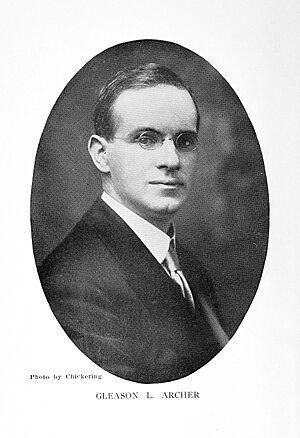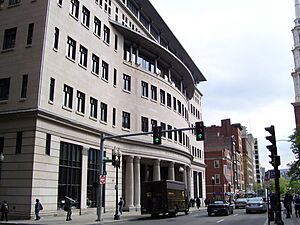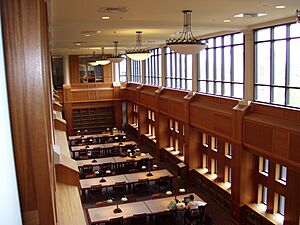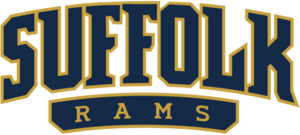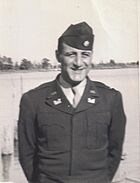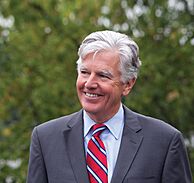Suffolk University facts for kids
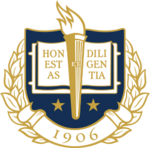 |
|
|
Former names
|
Archer's Evening Law School (1906–1907) Suffolk School of Law (1907–1937) Suffolk College of Arts and Sciences (1934–1937) College of Business Administration (1937) |
|---|---|
| Motto |
Honestas et Diligentia
|
|
Motto in English
|
Honesty and Diligence |
| Type | Private university |
| Established | 1906 |
| Founder | Gleason L. Archer |
| Accreditation | NEASC |
| Endowment | $246.2 million (2020) |
| Budget | $300 million (FY 2017) |
| President | Marisa Kelly |
| Students | 6,734 (fall 2022) |
| Undergraduates | 5,290 |
| Postgraduates | 1,165 |
| Location |
,
,
United States
42°21′28″N 71°03′40″W / 42.3579°N 71.0610°W |
| Campus | Urban, 350 acres (140 ha) |
| Colors | Navy Blue and Gold |
| Nickname | Rams |
|
Sporting affiliations
|
NCAA Division III Commonwealth Coast Conference Eastern College Athletic Conference |
| Mascot | Hiram (Rammy) the Ram |
| Website | Official Website: http://www.suffolk.edu/ |
 |
|
Suffolk University is a private university located in Boston, Massachusetts. It is a place where students go to learn and earn degrees. The university started as a law school in 1906. It was named after Suffolk County, Massachusetts, where it is located.
Suffolk University is home to about 7,500 students. It is one of the largest universities in the Boston area. The university also has a special group that studies what people think about politics, called the Suffolk University Political Research Center.
The university is in downtown Boston, near the historic Beacon Hill neighborhood. It has three main parts: the Suffolk College of Arts and Sciences, the Sawyer Business School, and the Suffolk University Law School. The university's sports teams are called the Suffolk Rams. They play in 19 different sports in NCAA Division III.
Contents
A Look at Suffolk University's History
Suffolk University was started in 1906 by a lawyer named Gleason Archer Sr.. He first called it "Archer's Evening Law School." He wanted to help students who worked during the day to study law at night. In 1907, the school moved to downtown Boston and was renamed "Suffolk School of Law."
A year later, the first students from the school passed their law exams. This made more people want to join. The school's main goal was to help "ambitious young men who are obliged to work for a living while studying law."
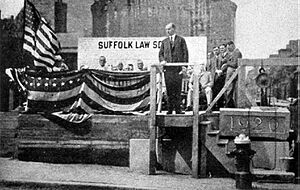
By 1930, Archer had made Suffolk one of the biggest law schools in the country. He then decided to create a larger university that working people could afford.
The school officially became a university in the 1930s. The "Suffolk College of Arts and Sciences" was started in 1934. The Sawyer Business School, which was then called the "College of Business Administration," began in 1937. In the same year, all three parts became one university, known as Suffolk University.
In the 1990s, Suffolk built its first dorms for students. It also started programs with other colleges and opened campuses in other countries. Between 1990 and 2005, the university grew a lot, with more money and more students.
University Leaders: Presidents of Suffolk
- Gleason Archer Sr. (1906–1948)
- Walter Burse (1948–1954)
- Robert Munce (1954–1960)
- Dennis C. Haley (1960–1965)
- John E. Fenton (1965–1970)
- Thomas Fulham (1970–1980)
- Daniel Perlman (1980–1989)
- David Sargent (1989–2010)
- Barry Brown (2010–2012) (interim)
- James McCarthy (2012–2014)
- Norman R. Smith (2014–2015) (interim)
- Margaret McKenna (2015–2016)
- Marisa Kelly (2016–present)
Exploring the Campus
Suffolk University's main campus is in downtown Boston. It is located on Beacon Hill, a famous area, and is close to the Massachusetts State House. Until 1995, students at Suffolk mostly lived at home and traveled to school. Now, the university has five dorms where students can live. These dorms house many first-year students and about a quarter of all undergraduate students.
Student Housing: Dorms at Suffolk
- Smith Hall
- Nathan R. Miller Hall
- 10 West
- Modern Theatre
- One Court Street
Smith Hall was the first dorm built by the university. It has different types of rooms, including singles, doubles, and suites. Nathan R. Miller Residence Hall opened in 2005. It has 15 floors for first-year students and two floors for second-year students. The 10 West Residence Hall opened in 2008 and offers rooms for first-year and second-year students.
Both Miller Hall and Smith Hall have cafeterias where students can eat. Students living at 10 West or Modern Theater can eat at Smith Hall. In 2020, the university added a new dorm at One Court Street, which is in the Ames Building.
In June 2024, Suffolk University announced plans for a sixth dorm. This new dorm will be at 101 Tremont Street.
What Students Learn: Academics at Suffolk
Suffolk University has over 900 teachers and staff. They teach about 10,000 students on the Boston Campus.
Business and Arts Programs
The Sawyer Business School teaches students about business, especially global business. It offers different degrees for both undergraduate and graduate students. About 3,000 students are in these programs. The school also has special programs like the Executive MBA, which includes trips to places like Madrid and China.
The Suffolk College of Arts and Sciences has 17 different departments. These departments offer more than 70 programs for students. One of these departments is the New England School of Art and Design (NESAD).
Law School and Research
The Suffolk University Law School started in 1906. It offers programs for students who want to become lawyers.
The university also has several research centers. These centers study different topics like crime, justice, women's health, and human rights. The Moakley Archives and the Poetry Center are also part of the university. The Suffolk University Political Research Center (SUPRC) conducts polls to find out what people think about political issues.
Suffolk University also has an honors program for students who do very well in their studies.
Sports at Suffolk: The Rams
Suffolk University's sports teams are called the Rams. They play in NCAA Division III. The Rams are part of the Conference of New England and the Eastern College Athletic Conference (ECAC). They used to be part of the Great Northeast Athletic Conference (GNAC) until 2020.
The university has many sports for both men and women. Men's sports include baseball, basketball, cross country, golf, ice hockey, soccer, and tennis. Women's sports include basketball, cross country, ice hockey, soccer, softball, golf, tennis, and volleyball.
Student News: The Suffolk Journal
The Suffolk Journal is the university's weekly student newspaper. It has been published continuously since 1936. The newspaper is 16 pages long and is given out around the campus.
Famous People from Suffolk University
Many notable people have studied or worked at Suffolk University.
Famous Graduates
- Paul Benedict, an actor known for TV shows like The Jeffersons.
- Eliza Dushku, an actress from Buffy the Vampire Slayer.
- John Hynes, who was the 49th mayor of Boston.
- Thomas J. Lane, a U.S. Representative from Massachusetts.
- William L. Uanna, who worked for the Central Intelligence Agency and was a security expert for The Manhattan Project.
- David Sargent, a former president of Suffolk University.
- Joe Moakley, a U.S. Representative from Massachusetts.
- Judge Frank Caprio, a well-known television judge.
- Robert L. Caret, who was the Chancellor of the University System of Maryland.
- William F. Galvin, the Secretary of State of Massachusetts.
- Dan Harrington, a famous poker player who won the 1995 World Series of Poker.
- Robert A. DeLeo, a former Speaker of the Massachusetts House of Representatives.
- John F. Tierney, a U.S. Representative from Massachusetts.
- Martin Meehan, a former U.S. Representative and current president of the University of Massachusetts.
- Jenna Mourey (Jenna Marbles), a popular YouTube personality.
Notable Teachers and Trustees
- Joseph Glannon, a law professor and writer.
- Joseph P. Hoar, a trustee who was a Commander in Chief of U.S. Central Command.
- Tom "Clack" Magliozzi, a business professor and co-host of Car Talk.
- Gerald Peary, a professor and film critic.
 | Stephanie Wilson |
 | Charles Bolden |
 | Ronald McNair |
 | Frederick D. Gregory |


